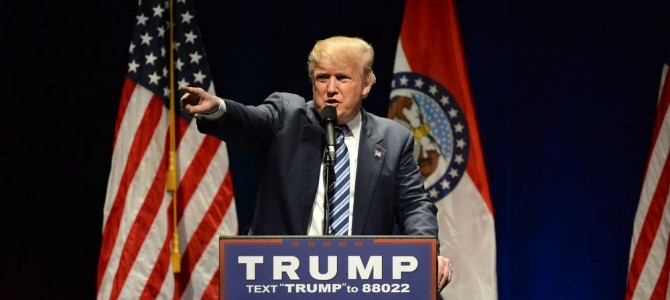
Donald Trump’s prescriptions for U.S. foreign policy would work fine on a planet made for his convenience. Not on planet Earth. On this planet, securing the American people’s safety and interests through peoples who are not at all impressed with a rich man’s antics requires understanding what it takes to achieve what, where, and under what circumstances.
On April 27, Trump read a speech filled with the establishment’s evasions of reality. Truly, they are “timeless.” During the past quarter-century, they have resulted in less safety and more trouble. Following them in the future would make things worse.
Arguably the most consequential of Trump’s imitations of the establishment’s “What—me, worry?” attitude is about what China is doing in the Western Pacific. What China is doing is not a continuation of what he claims is the Chinese government’s lifting of 800 million people out of poverty. The lifting that has occurred has resulted from that talented people’s hard labor, despite a corrupt, tyrannical government.
No. China’s political claims to the world’s busiest shipping lanes, backed by an impressive, intelligently designed military buildup, is a naked grab for hegemony over a major part of the world. This, if not countered just as intelligently and forcefully, will lead to a major war that will be hard for Americans to avoid.
Wanting peace, as Americans do, with China, Japan, Russia, and all of the Western Pacific’s nations, we had better look at what is going on there with a firm resolve to do the hard things that will be necessary to keep that peace.
The Risk of Nuclear War
First, let us not overlook the seriousness of China’s claims. It has built a series of artificial islands out of coral atolls jutting out of the sea, called them a province of China, installed a provincial capital, extended claims of sovereignty over the surrounding seas and air space, and is making them into formidable military bases — far more capable than aircraft carriers, and unsinkable.
The response the Obama administration and all Republicans except Ted Cruz have advocated—namely, to increase U.S. air and naval patrols in the area to assert “freedom of navigation”—merely fools ourselves into forgetting that, soon, challenging China’s capacity to exclude whomever it wishes from the area would take U.S. carrier task forces and risk nuclear war.
We are not prepared to make such a challenge. Nor are we prepared to concede the Western Pacific to China, or to a war between China and Japan, of which Russia would be a part. Nor do we possess the kind of anti-missile defenses that would allow us to shield ourselves from the most immediate and disastrous consequences of such confrontations.
Trump would not even have us thinking about such things. Nor, of course, would any conceivable Democratic candidate. Talking about generic buildups of American military power just dispenses more tranquilizers. Nobody has ever been protected by an amorphous percentage of gross domestic product devoted to “defense.” Keeping the peace—today as ever in human history—requires the obvious capacity to survive and win wars. That’s the meaning of deterrence.
Earth to Voters
Neither Trump nor his advisers, whose ventures in international affairs have been about making money for themselves, think about what it takes to do such things.
By the same token, the most concrete things Trump had to say about our problems with the ISIS army that beheads Americans, Christians, and Jews in the Middle East and encourages some Americans to murder others is pure fantasy. Destroy them, he says. Sure. But he does not say what it would take, or how he would overcome the problems that stand in the way of doing it.
He does mention that Turkey’s president, Recep Tayyip Erdogan, is such a problem, without telling us the nature of the problem and what to do about it. In fact, Erdogan is keeping ISIS alive by preventing the Turkish border from being closed to the flow of men, money, and supplies without which ISIS would die. Who can close that border? The Kurdish tribes who live near the remaining gap are eager to do it. But Erdogan is far more concerned with making war on the Kurds than with making war on ISIS.
Trump has no idea of such things. The U.S. government knows them well. But deferring to Erdogan does not give the Kurds the weapons with which they would sweep ISIS away from that border and hence choke it. Now the Russians are going to help the Kurds. Thus Putin, by being a better ally to the Kurds in a cause that is more directly America’s than Russia’s, is in the process of consolidating Russia’s position in that region—a position he will use against the American people’s interests.
Our foreign policy establishment is wedded to concepts that have brought us only trouble. Trump senses that something is wrong. But, since his and his teleprompter’s understanding do not penetrate beneath slogans, to follow Trump is to get into deeper troubles. It is high time to be serious about formulating a foreign policy based on the realities of planet Earth.









